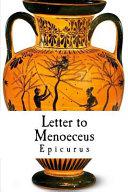Quotes from work
Letter to Menoeceus

Letter to Menoeceus - Epicurus - Translated by Robert Drew Hicks - Epicurus; 341-270 BC, was an ancient Greek philosopher as well as the founder of the school of philosophy called Epicureanism. Only a few fragments and letters of Epicurus's 300 written works remain. Much of what is known about Epicurean philosophy derives from later followers and commentators. For Epicurus, the purpose of philosophy was to attain the happy, tranquil life, characterized by ataraxia-peace and freedom from fear-and aponia-the absence of pain-and by living a self-sufficient life surrounded by friends. He taught that pleasure and pain are measures of what is good and evil; death is the end of both body and soul and should therefore not be feared; the gods neither reward nor punish humans; the universe is infinite and eternal; and events in the world are ultimately based on the motions and interactions of atoms moving in empty space. Epicurus is a key figure in the development of science and scientific methodology because of his insistence that nothing should be believed, except that which was tested through direct observation and logical deduction. He was a key figure in the Axial Age, the period from 800 BC to 200 BC, during which, according to Karl Jaspers, similar thinking appeared in China, India, Iran, the Near East, and Ancient Greece. His statement of the Ethic of Reciprocity as the foundation of ethics is the earliest in Ancient Greece, and he differs from the formulation of utilitarianism by Jeremy Bentham and John Stuart Mill by emphasizing the minimization of harm to oneself and others as the way to maximize happiness.

"Letter to Menoeceus" http://www.epicurus.net/en/menoeceus.html, as translated in Stoic and Epicurean (1910) by Robert Drew Hicks, p. 167
Variant translation: Let no one delay to study philosophy while he is young, and when he is old let him not become weary of the study; for no man can ever find the time unsuitable or too late to study the health of his soul. And he who asserts either that it is not yet time to philosophize, or that the hour is passed, is like a man who should say that the time is not yet come to be happy, or that it is too late. So that both young and old should study philosophy, the one in order that, when he is old, he many be young in good things through the pleasing recollection of the past, and the other in order that he may be at the same time both young and old, in consequence of his absence of fear for the future.
Context: Let no one be slow to seek wisdom when he is young nor weary in the search of it when he has grown old. For no age is too early or too late for the health of the soul. And to say that the season for studying philosophy has not yet come, or that it is past and gone, is like saying that the season for happiness is not yet or that it is now no more. Therefore, both old and young alike ought to seek wisdom, the former in order that, as age comes over him, he may be young in good things because of the grace of what has been, and the latter in order that, while he is young, he may at the same time be old, because he has no fear of the things which are to come. So we must exercise ourselves in the things which bring happiness, since, if that be present, we have everything, and, if that be absent, all our actions are directed towards attaining it.